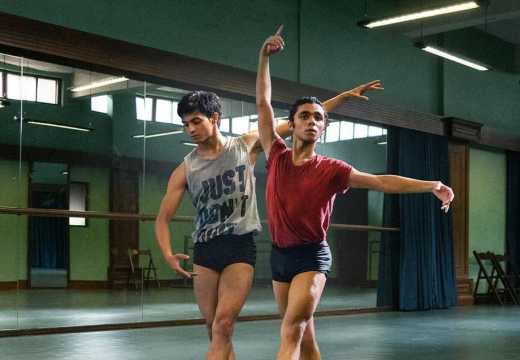
Shriram Iyengar
Mumbai, 14 Mar 2020 8:30 IST
Updated: 16 Mar 2020 11:16 IST
In this Netflix Original film, Sooni Taraporevala captures the beauty and gritty struggle of dancers as they move past class and religious bias to find their own path.

In a moment of righteous anger, Julian Sands's cantankerous teacher explodes, ''Ballet is not bullshit. Religious discrimination is bullshit." This could have been the moment where Sooni Taraporevala's film delivers a potent message of art unifying differences. But this is not that kind of film. Taraporevala adds subtle layers of socio-political commentary on class disparity, communal strife, and the city that binds it all together.
This Netflix Original film revolves around the two contrasting personalities of Manish (Manish Chauhan) and Asif (Achintya Bose), young, talented dancers struggling to find a place for themselves in society. While Manish/Nishu is a 'star' discovered on the stage of reality television, his real world is dominated by the presence of his father (Vijay Maurya), a taxi driver. Asif, meanwhile, finds his peace with his street friends even as he bristles with anger when his father gives in to the domineering and religiously conservative uncle.
The film has some similarities with Zoya Akhtar's Gully Boy (2019), in the setting and the uplifting theme, but the approach is different. Where Zoya cast a clear divide between the classes, in Yeh Ballet, the divide is not so black and white. A poor Nishu can make friends with a very rich girl in the same way that Asif's brother, who delivers pizza, manages to make friends with the manager of the dance studio and get his brother a free pass. These boundaries are practically invisible in the urban jungle, and only emerge when one encroaches on the other. These subtle divides exist throughout, most dominantly in the hearts of people themselves.
So when Asif flirts with a young woman from another community, or Nishu is discovered learning ballet, they are shown their place. Their redemption lies in dance, taught by the cantankerous ballet teacher, Saul Aaron (Sands). An exile seeking his own redemption, Saul moulds these two boys into the first Indian professionals to head to the United States to learn ballet.
Eventually, the trio bond together like exiles discovering their own family. The subtle way in which Asif stands up for Nishu, or Saul bequeaths his heirloom to the duo as they leave for America, are touching moments. It also sheds light on the unseen community of dancers, people who learn, teach, and stand up for one another in an industry that is fiercely competitive.
Taraporevala's story is based on her own documentary of Manish Chauhan and Amiruddin Shah. Chauhan plays himself, and has a certain vulnerability that comes across well on the screen. His opposite is Achintya Bose's Asif. Rebellious, angry, he plays the underdog to the T. Sands does well, and the portrayal of his exile and loneliness is touching. One only wishes it were explored a little more.
There are moments when the film's cinematic technique feels heavy on the emotions. Yet, it is at no point tedious or dawdling. There is a languor that grows on the viewer with time. This is helped by the presence of a very talented supporting cast in Maurya, Danish Hussain and Jim Sarbh. While their characters are not fleshed out as much as we would have liked, they still make an impact. Maurya and Sarbh create some very interesting moments, leaving you wanting more.
While it is not necessarily a drawback, the wandering nature of the narrative sometimes takes the film away from its core. The absence of a thumping musical score, apart from the dance movements, is also a negative.
The technical superiority of the film is not in question. The visuals of the choreography and the dance sequences, particularly the ones involving the two youngsters, are done well. Both actors are incredibly captivating in their dance movements, and expressive too.
Kartik Vijay's camera moves in close quarters through the darkness and the light, with the darkness making for the more interesting shots. The production design (Shailaja Sharma) also deserves a mention with its very realistic presence.
Taraporevala's film, however, lacks a central conflict, an intensity that would have given this human drama a lift. The story of the two boys, while inspiring, feels a little predictable and fails to make an emotional impact. The choreography of the dance movements (Shiamak Davar, Cindy Jourdain and Vitthal Patil) is impressive.
Despite that, Taraporevala's film captures the visuals and subtlety of a city divided by class and united often by the art form. In Manish and Asif's story, she manages to capture the changing notion of art, hopeful that it will induce more walls to fall. Unlikely, but a hopeful tale.
Related topics
NetflixYou might also like

Review Hindi
Jogi review: Diljit Dosanjh-starrer is more like a thriller revolving around 1984 riots
The Ali Abbas Zafar film takes you by surprise with the riot angle brought in much earlier in the...

Review Hindi
Matto Ki Saikil review: Prakash Jha leads this sentimental saga of socio-economic inequality
Written and directed by M Gani, the Hindi film is a patchy yet heartbreaking look at the bleak class...

Review Hindi
Jhini Bini Chadariya review: A moving lamentation for the holy city of Varanasi
Ritesh Sharma’s hard-hitting film lays bare the social fabric of the city and the growing...

